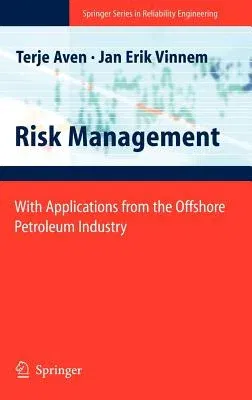Terje Aven
(Author)Risk Management: With Applications from the Offshore Petroleum Industry (2007)Hardcover - 2007, 15 February 2007

Qty
1
Turbo
Ships in 2 - 3 days
In Stock
Free Delivery
Cash on Delivery
15 Days
Free Returns
Secure Checkout

Part of Series
Springer Reliability Engineering
Part of Series
Springer Series in Reliability Engineering
Print Length
200 pages
Language
English
Publisher
Springer
Date Published
15 Feb 2007
ISBN-10
1846286522
ISBN-13
9781846286520
Description
Product Details
Authors:
Book Edition:
2007
Book Format:
Hardcover
Country of Origin:
NL
Date Published:
15 February 2007
Dimensions:
23.39 x
15.6 x
1.42 cm
ISBN-10:
1846286522
ISBN-13:
9781846286520
Language:
English
Location:
London
Pages:
200
Publisher:
Weight:
480.81 gm